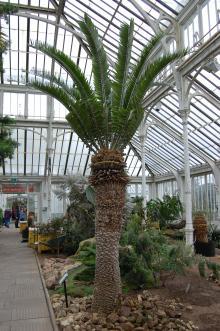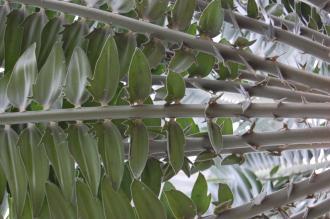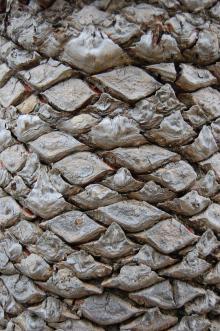
Encephalartos woodii (Kew Gardens, London)
Position: Full sun to light shade
Flowering period: Not known
Soil: Moist, well drained
Eventual Height: 6m
Eventual Spread: 3m
Hardiness: 10a – 11
Family: Zamiaceae
Encephalartos woodii is an evergreen palm like tree. Its glossy dark green leaves are up to 2.5m long, arching, with up to 150 leaflets. Its leaflets are falcate, up to 15cm long and 3cm broad. Its trunk may achieve a diameter of up to 50cm. Its bark. Its flowers are dioecious, however this is academic as there are no female plants know to be in existence. Its male strobili (cone like structures) are bright orange, cylindrical, up to 1.2m long and 25cm across. Suckers are produced on the stem of this plant, these can be removed and propagated.

Encephalartos woodii Leaf (Kew Gardens, London)
Encephalartos woodii, commonly known as Wood’s Cycad, is native to Zululand. This tree is one of the worlds rarest plants, only one specimen was ever found and the plant was a male. It is now extinct in the wild, with around 500 clones grown in botanical gardens around the world. This plant is classified as Extinct in the Wild according to the IUCN Red List of Threatened Species.
The etymological root of the binomial name Encephalartos is derived from the Greek en meaning ‘in, kefalos meaning ‘head’ and artos meaning ‘cake’. Woodii is named after John Medley Wood (1827 – 1915), a curator of Durban Botanic Garden.

Encephalartos woodii Bark (Kew Gardens, London)
The landscape architect may find Encephalartos woodii useful as an attractive, small specimen tree. However, due to this tree’s current rareness it is unlikely to be available.
Ecologically, Encephalartos woodii is attractive to pollinating insects.
Encephalartos woodii prefers moist, fertile, well-drained soils. It tolerates most pH of soil.
Encephalartos woodii requires little maintenance.

